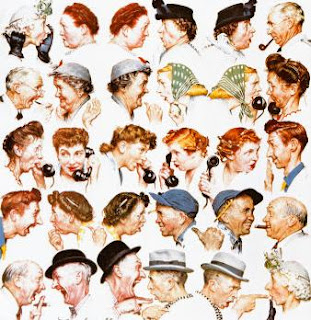What's wrong with using "said" in composition and creative writing?
Let's be clear: it is not incorrect to write 'he said' or 'she said.'
In fact, it may be advantageous to let the dialogue do the work and to leave the specific manner or tone of speech to the reader's imagination. The reader often has an intuitive grasp of the flow of emotions.
Close examination shows that there are many options if you want to replace the word 'said', but sometimes you don't need to use it at all.
The word 'said' also preserves a potential ambiguity. Again this can be helpful in creative writing if you do not want to direct the reader to a specific interpretation. Why not trust the reader to unmask irony and double-meanings in the speech? Often, the writer who lacks confidence wants to fill in all the gaps. Sometimes it is better to be less busy, and to leave some space for the reader to work on the prose. Writing presupposes a partnership; it is not a dictatorship.
The word 'said' can also be complemented by an action, or by a descriptive phrase:
He said, slipping the gold coin into his greasy pocket
Returning the frightened mouse to its cage, she said
This technique helps to develop character or to reveal a new aspect of a situation that contributes to plot development. Remember that readers enjoy hints; they enjoy being taken into confidence and they enjoy moments of revelation. What readers dislike is a unwieldy smack in the face.
Another advantage of the word 'said' is that it is unobtrusive. It does not draw attention to itself. Words such as beseeched or chortled tend to stand out, and they may also sound rather stilted and old-fashioned unless you're writing sensational fiction or romance.
In many cases it is possible to present dialogue without pointing to who the speaker and signifying how they spoke. By repeatedly inserting 'he said' or 'she said' the flow of speech is interrupted, and the effect may become mechanical and monotonous. Effective dialogue requires pace: too much commentary from the writer is intrusive and tiresome. An irritated reader stops reading.
Excessive use of words other than said also runs the risk of starting to sound ridiculous. Writing should not sound like a regurgitated thesaurus! Sometimes writers try too hard to improve their writing and fall into a new category of error.
Try reading your work aloud if you are unsure about appropriate usage. By listening to your work you will move slowly from the craft of composition to the art of writing.
But if you do want to gain a sense of the rich opportunities for variation afforded by the English language there are more than 107 Ways to Avoid the word "said"
- Acknowledged
- Added
- Admitted
- Affirmed
- Agreed
- Alleged
- Announced
- Answered
- Appealed
- Asked
- Asserted
- Barked
- Bawled
- Beckoned
- Begged
- Bellowed
- Beseeched
- Blubbered
- Blurted out
- Carped
- Cautioned
- Chortled
- Chuckled
- Claim
- Conceded
- Concurred
- Confessed
- Confided
- Confirmed
- Contended
- Continued
- Cried
- Croaked
- Declared
- Entreated
- Exclaimed
- Explained
- Fumed
- Giggled
- Grinned
- Groaned
- Growled
- Grumbled
- Hesitated
- Hinted
- Hissed
- Howled
- Implied
- Implored
- Indicated
- Informed
- Inquired
- Insisted
- Jabbered
- Joked
- Lamented
- Laughed
- Lilted
- Maintained
- Moaned
- Mocked
- Murmured
- Mused
- Noted
- Observed
- Offered
- Ordered
- Pleaded
- Preached
- Proclaimed
- Promised
- Proposed
- Protested
- Queried
- Quipped
- Ranted
- Remarked
- Remonstrated
- Repeated
- Replied
- Requested
- Retorted
- Roared
- Scoffed
- Scolded
- Shouted
- Shrieked
- Snarled
- Sobbed
- Specified
- Spluttered
- Stammered
- Stated
- Stuttered
- Stressed
- Suggested
- Swore
- Taunted
- Teased
- Testified
- Thundered
- Wailed
- Warned
- Whimpered
- Whined
- Whispered
- Yelled
The Art of Connection: the Social Life of Sentences (Quibble Academic 2013)
Also available on Kindle, or to download.
Dr Ian McCormick served until recently as Professor in the Arts at the University of Northampton. He works as a teaching adviser in educational creativity and participatory methodology. He has recently written a book on Shakespearean Tragedy.




"Never use a verb other than ''said'' to carry dialogue" ---- Elmore Leonard.
ReplyDelete